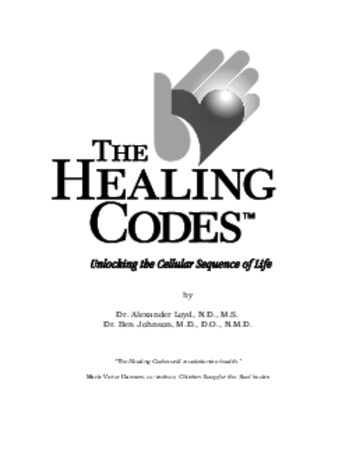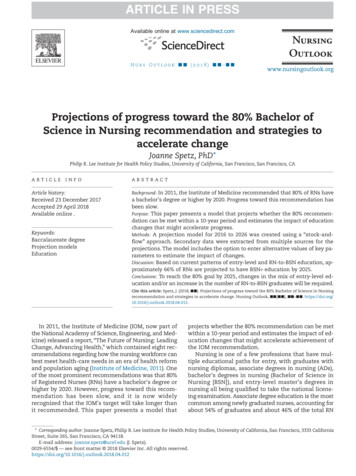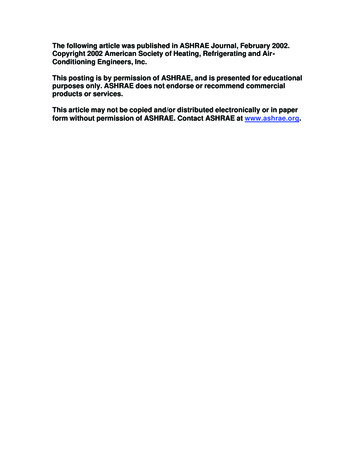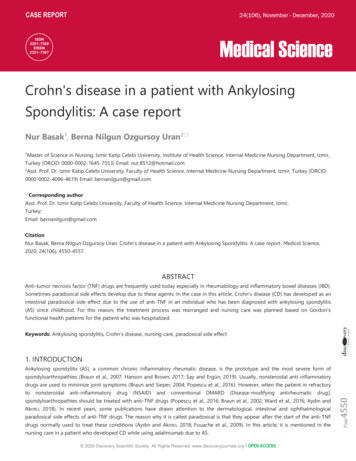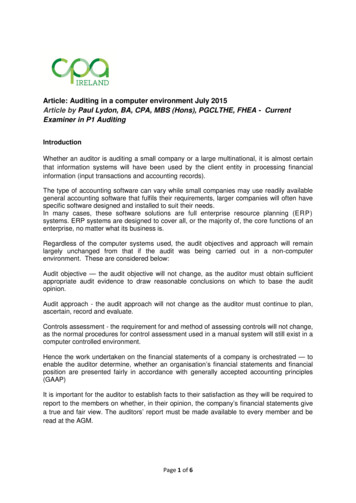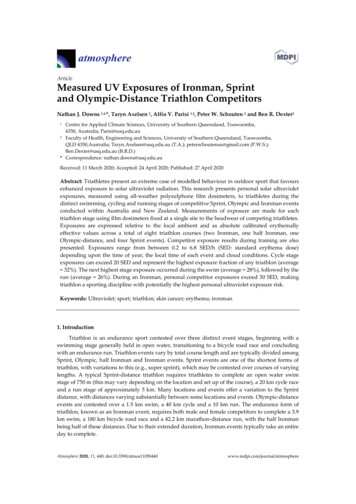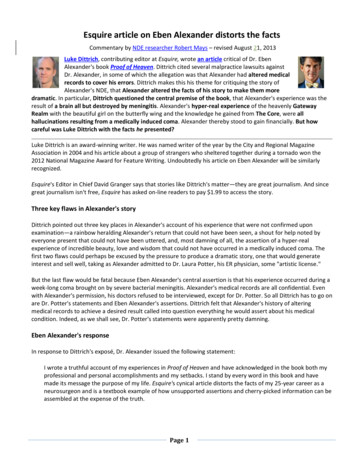
Transcription
Esquire article on Eben Alexander distorts the factsCommentary by NDE researcher Robert Mays – revised August 21, 2013Luke Dittrich, contributing editor at Esquire, wrote an article critical of Dr. EbenAlexander's book Proof of Heaven. Dittrich cited several malpractice lawsuits againstDr. Alexander, in some of which the allegation was that Alexander had altered medicalrecords to cover his errors. Dittrich makes this his theme for critiquing the story ofAlexander's NDE, that Alexander altered the facts of his story to make them moredramatic. In particular, Dittrich questioned the central premise of the book, that Alexander's experience was theresult of a brain all but destroyed by meningitis. Alexander's hyper-real experience of the heavenly GatewayRealm with the beautiful girl on the butterfly wing and the knowledge he gained from The Core, were allhallucinations resulting from a medically induced coma. Alexander thereby stood to gain financially. But howcareful was Luke Dittrich with the facts he presented?Luke Dittrich is an award-winning writer. He was named writer of the year by the City and Regional MagazineAssociation in 2004 and his article about a group of strangers who sheltered together during a tornado won the2012 National Magazine Award for Feature Writing. Undoubtedly his article on Eben Alexander will be similarlyrecognized.Esquire's Editor in Chief David Granger says that stories like Dittrich's matter—they are great journalism. And sincegreat journalism isn't free, Esquire has asked on-line readers to pay 1.99 to access the story.Three key flaws in Alexander's storyDittrich pointed out three key places in Alexander's account of his experience that were not confirmed uponexamination—a rainbow heralding Alexander's return that could not have been seen, a shout for help noted byeveryone present that could not have been uttered, and, most damning of all, the assertion of a hyper-realexperience of incredible beauty, love and wisdom that could not have occurred in a medically induced coma. Thefirst two flaws could perhaps be excused by the pressure to produce a dramatic story, one that would generateinterest and sell well, taking as Alexander admitted to Dr. Laura Potter, his ER physician, some "artistic license."But the last flaw would be fatal because Eben Alexander's central assertion is that his experience occurred during aweek-long coma brought on by severe bacterial meningitis. Alexander's medical records are all confidential. Evenwith Alexander's permission, his doctors refused to be interviewed, except for Dr. Potter. So all Dittrich has to go onare Dr. Potter's statements and Eben Alexander's assertions. Dittrich felt that Alexander's history of alteringmedical records to achieve a desired result called into question everything he would assert about his medicalcondition. Indeed, as we shall see, Dr. Potter's statements were apparently pretty damning.Eben Alexander's responseIn response to Dittrich's exposé, Dr. Alexander issued the following statement:I wrote a truthful account of my experiences in Proof of Heaven and have acknowledged in the book both myprofessional and personal accomplishments and my setbacks. I stand by every word in this book and havemade its message the purpose of my life. Esquire's cynical article distorts the facts of my 25-year career as aneurosurgeon and is a textbook example of how unsupported assertions and cherry-picked information can beassembled at the expense of the truth.Page 1
The heralding rainbow that could not have been witnessedOn Sunday morning, November 16, 2008, after several days of relentless rain, the rain stopped. Eben Alexanderwas coming out of his coma. Eben Alexander's sister Phyllis and their 87-year-old mother, Betty, were on their wayinto the hospital (Betty was in a wheelchair) when they saw a "perfect rainbow" toward the distant peaks. Dittrichcommented, "It was as though heaven itself was cheering Alexander's return."Only that could not have happened. NOAA meteorologist Dave Wert checked the weather records for thesixteenth—it was a clear day. Could there have been a rainbow the morning of the sixteenth? “No,” he says.For Dittrich, this is clearly an open-and-shut case of embellishment. Of course, the rainbow wasn't observed byAlexander, since he was just coming out of coma. Alexander was either told this purported fact by Phyllis or he justmade it up to give a nice twist to the story.Why investigate further? The meteorologist's pronouncement is definitive after all: no rainbow would have beenpossible on that morning. Therefore it must be a fabrication by Alexander.In fact, if Dittrich had interviewed Phyllis, she would have told him: she and her mother saw a rainbow as they wereentering the hospital about 1 PM. It was to the right of the entrance (north of the hospital) where there aremountains. They commented on the rainbow and Betty noted, "It's a perfect rainbow!" When they turned thecorner into Eben's ICU room a few moments later, Eben was sitting up in bed.Later that day, Phyllis emailed friends back in Boston, telling them about Eben's miraculous recovery—and aboutthe rainbow she and her mother had witnessed. She offered to show me the email.So how can we reconcile a two-person eyewitness account with contemporaneous corroborative documentationand an expert meteorologist's pronouncement? Could Phyllis Alexander and her mother have been mistaken?"No," Phyllis replies, "we both saw it. If I'd known I'd be 'on trial' about it later, I would have taken a picture of it."An ordinary rainbow—one following a rainstorm—would be very unusual on an apparently clear day at 1 PM inNovember. However, there are many ways for a rainbow to occur. In any case, a rainbow was clearly seen on thatSunday morning when Eben Alexander came out of coma. He was told about it later. He did not fabricate the storyor embellish the details as Dittrich implies.Alexander's sister Phyllis was always one phone call away, as she was when I phoned her. Alexander's accountclearly states that Phyllis witnessed a rainbow on that specific day. Considering that Dittrich was calling intoquestion a man's integrity and honesty, he should have investigated this further, to corroborate with other sources,to get to the bottom of the apparent contradiction.The shout for help that could not have been utteredIn one of the book's most dramatic scenes, Dr. Laura Potter prepares Alexander to move from the ER to the ICU. Inthose final moments, after two straight hours of struggle—thrashing and guttural groans and wails—EbenAlexander grows quiet and shouts out, for everyone present to hear, "God, help me!" The doctors, nurses, his wifeHolley and his neighbor Michael Sullivan, an Episcopal rector, rush to his stretcher, but Alexander remainscompletely unresponsive.Dramatic, but it could not have happened. Dr. Potter has no recollection of the incident but she does rememberthat she intubated Alexander more than an hour before his departure from the ER. Could he have shoutedanything, let alone something clearly heard? "No," she says.Page 2
For Dittrich, another clearly open-and-shut case of embellishment or fabrication. Of course, at the time Alexanderwas in a coma, so he was either told this purported fact by Holley or someone else, or he just made it up to giveanother dramatic, emotional twist to the story.Again, why investigate further? The facts given by Dr. Potter are crystal clear and make complete sense: theintubation would almost certainly be done in the ER and Alexander's status stabilized before transferring to theICU. Therefore it must be another fabrication by Alexander.In fact, if Dittrich had asked her, Holley would have confirmed the story: indeed, at some time in the ER Eben hadshouted out "God, help me!" and everyone present including Holley and Michael Sullivan had rushed to his side—Holley had been just outside the curtain—but Alexander fell back unresponsive. Those present were given hopethat he was recovering, but those hopes faded quickly.I spoke with Holley Alexander recently. She said that this incident occurred about an hour or so after she hadarrived in the ER with Eben. “It happened before they sedated him, while the doctors were trying to get vital signsand spinal fluid and all that. I said to Michael [Sullivan], ‘He spoke!’ and Eben kept writhing. Dr. Potter might nothave heard it. She was in and out, checking scans, spinal fluid, so it’s very likely that she wasn’t there.”And yes, this happened before Alexander was intubated, so Eben Alexander's only embellishment was to fudge thetiming of the incident, for dramatic effect—a trivial adjustment.During the many hours Luke Dittrich spent talking to Eben Alexander in his home, he could easily have asked Holley,who was present the whole time, about this incident. He did not. Perhaps Dittrich suspected collusion betweenEben and Holley, so her account of the facts would not have been reliable. Still he could have talked to theirneighbor and Episcopal rector Michael Sullivan. Again he did not.Now we have two of the three key flaws in Eben Alexander's story that have turned out to be trivial. But it's nottrivial that Luke Dittrich is relying on these apparent inconsistencies to build a case that Alexander's story is acomplete fabrication, a hallucination, a fantasy.All it would have taken was a simple conversation with two of the people identified in Proof of Heaven as witnessesto corroborate or refute Alexander's account. In both cases, Luke Dittrich would have found completecorroboration of Alexander's portrayal of the rainbow and nearly complete corroboration of the shout in the ER.Journalists and their editors have a duty to investigate and report the facts objectively and accurately. It appears inthese first two cases that Luke Dittrich and his editors failed in this duty.The hyper-real experience that could not have occurred in a medically induced comaLuke Dittrich's interpretation of Proof of Heaven hinges most on the question of coma. Coma is a state ofunconsciousness lasting more than six hours, in which a person: cannot be awakened; fails to respond normally topainful stimuli, light, or sound; lacks a normal sleep-wake cycle; and, does not initiate voluntary actions. In order tomaintain consciousness, a person needs to have a perfectly functioning cerebral cortex and brainstem.Was Eben Alexander conscious during any of his stay in the hospital? Not according to Alexander's account—hewas out when he lost consciousness in his home after shouting to his son, "Have a good day at school", probablyaround 8 AM on Monday, until he awoke the next Sunday morning probably around 9 AM.Eben Alexander had developed a severe case of bacterial meningitis. There were lots of measures of how serioushis condition was: the very quick onset of his symptoms, persistent seizure (status epilepticus), the presence of E.coli bacteria in his cerebral spinal fluid (CSF), the high white blood cell count and high protein level in his CSF, thePage 3
very low glucose level in his CSF, and the CT scans of his brain that showed diffuse edema, damage in all eight lobesof his cortex and widespread blurring of the gray-white junction.And there were several specific neurological exams showing severe alterations: abnormal posturing indicatingdamage to the cortex and thalamus, florid papilledema indicating elevated intracranial pressure, fixed pupilsindicating brainstem damage, and no vestibulo-ocular reflex also indicating brainstem damage. Alexander's motorresponse declined further to "no motor response to noxious stimuli," indicating widespread cortical and brainstemdamage.Yes, Eben Alexander's medical records are all confidential. But Alexander published these results in an article, "MyExperience in Coma", in AANS Neurosurgeon, located here and also released these results for a podcast interviewon Skeptiko.com, located here. Dittrich surely had access to both sources.The most important indicator of Alexander’s coma state was his Glasgow Coma Scale (GCS) score of 8 (p. 25 inProof of Heaven). The Glasgow Coma Scale ranges from 15 (fully conscious) to 3 (deep coma). A score of 8 is belowthe midpoint and indicates "severe brain injury" and a state of coma. Eben Alexander had a GCS of 8 on admission.But Luke Dittrich focuses on the fact that Alexander was groaning and flailing about and had to be placed in achemically induced coma. Dittrich recounts how Dr. Potter described it:"We couldn't work with Eben at all, we couldn't get vital signs, he just was not able to comply. So I had tomake the decision to just place him in a chemically induced coma. Really for his own safety, until we couldtreat him. And so I did. I put him to sleep, if you will, and put him on life support."After Alexander was taken from the ER to the ICU, Potter says, the doctors there administered anesthetics thatkept him in the coma. The next day, she went to visit him."And of course he was still in an induced coma," she says. "On ventilator support. They tried to let him wakeup and see what he would do, but he was in exactly the same agitated state. Even if they tried to ease up, alittle bit even, on the sedation. In fact, for days, every time they would try to wean his sedation—justthrashing, trying to scream, and grabbing at his tube."So, on the basis of these statements Dittrich concluded that Alexander's coma was induced and maintained solelyby anesthetics:In Proof of Heaven, Alexander writes that he spent seven days in "a coma caused by a rare case of E. colibacterial meningitis." There is no indication in the book that it was Laura Potter, and not bacterialmeningitis, that induced his coma, or that the physicians in the ICU maintained his coma in the days thatfollowed through the use of anesthetics. (emphasis added)This point goes to the heart of Eben Alexander's story, because according to Alexander he didn't have a workingbrain and therefore his memories couldn't have been hallucinations. Dittrich continues:[Alexander] notes that by conventional scientific understanding, "if you don't have a working brain, you can'tbe conscious," and a key point of his argument for the reality of the realms he claims to have visited is that hismemories could not have been hallucinations, since he didn't possess a brain capable of creating even ahallucinatory conscious experience. (emphasis added)So was Eben Alexander conscious during his stay in the hospital? Dittrich describes the key question:Page 4
I ask Potter whether the manic, agitated state that Alexander exhibited whenever they weaned him off hisanesthetics during his first days of coma would meet her definition of conscious."Yes," she says. "Conscious but delirious." (emphasis added)There it is: for Dittrich, conclusive proof that Eben Alexander was conscious, although severely sick, and wasmaintained in a medically induced coma by administration of anesthetics. And Eben Alexander failed to disclosethat key fact in his book.This is the final incontrovertible evidence Dittrich needed to complete his exposure of Eben Alexander as a fraud.He probably reasoned that, at best Alexander's experiences of the "heavenly realms" were just hallucinationsbrought about by his illness, whenever the doctors reduced his sedatives and he regained a kind of dream-likeconsciousness. The fact that Alexander did not disclose the real cause of his unconscious state—we can't really callit "coma" because it was readily reversible—just underscores that he is a fraud.This is a crucial conclusion for Dittrich to make: it exposes Eben Alexander clearly as deceptive and fraudulent or, atbest, delusional. An accusation of fraud against an individual is serious and ought to give a journalist some pause.But Dittrich's evidence is clear and incontrovertible. An experienced doctor, who had observed Alexander overseveral days, declared that Alexander was definitely "conscious but delirious."And an intermittent delirious state would explain fully Eben Alexander's internal experience, from the "EarthwormEye View"—under anesthesia—to the Spinning Melody—starting to come out of anesthesia—then to “TheGateway” and beyond—a dream-like state.A perfect fit. Explaining a fully hallucinatory experience.Once again, why investigate further? There's no need for corroboration, no need to check with other experts aboutall the indications that his brain was severely damaged by the bacterial infection. After all, the experts weren'tthere in the ER and the ICU. And the other doctors who were involved with Alexander's case refused to beinterviewed. The one doctor who was present is certainly sufficient. And the other doctors would undoubtedlycorroborate Dr. Potter's assessment.But what about the overwhelming evidence for severe meningitis? The data all come directly from Alexander. Hecould easily have exaggerated, embellished or even fabricated them—a very good reason for Alexander to insistthat his medical records be kept confidential.Did Luke Dittrich attempt to corroborate Dr. Potter's assessment with anyone else who was involved? No.It would have been very easy to ask Holley what the other doctors had been telling her. After all that's supposedlywhere Eben had gotten the story. But Holley could have colluded with Eben. In any case she was not asked. Holley'sfriend Sylvia White, who was also present for these consultations, could have been asked, but she, too, was not.Were Luke Dittrich or his editors at all concerned that the very heart of their portrayal of Eben Alexander as a fraudwas based on the sole assessment of one doctor? Apparently not.Were they concerned that Luke Dittrich might have misheard Dr. Potter or possibly misinterpreted what she hadtold him? Apparently not.Dittrich did not recheck with Dr. Potter and did not show her how he was quoting her. Had he done so, he wouldhave gotten a surprise.Page 5
Members of the Alexander family circle have told me that Dr. Laura Potter expressed to them concern after shewas contacted by the press when the Esquire article first appeared, and subsequently expressed her alarm aboutthe way her remarks had been twisted. She felt that Luke Dittrich had misrepresented what she had told him andtaken her words out of context. She felt that he had led her to say certain things.So Luke Dittrich's portrayal of the events regarding Alexander's illness is inaccurate. Dittrich took Dr. Potter'sstatements out of context, twisted them and misrepresented them.And what are the facts regarding Eben Alexander's coma state? If Luke Dittrich had read Proof of Heaven with anycare, he would have found a definitive statement of the facts about Alexander’s coma in Appendix A, fromAlexander’s infectious disease specialist Dr. Scott Wade:Dr. Alexander had become ill quickly with flu-like symptoms, back pain, and a headache. He was promptlytransported to the Emergency Room, where he had a CT scan of his head and then a lumbar puncture withspinal fluid suggesting a gram-negative meningitis. He was immediately begun on intravenous antibioticstargeting that and placed on a ventilator machine because of his critical condition and coma. . Despiteprompt and aggressive antibiotic treatment for his E. coli meningitis as well as continued care in the medicalintensive care unit, he remained in a coma six days and hope for a quick recovery faded (mortality over 97percent). (p. 183, emphasis added)Did Luke Dittrich read this part of Proof of Heaven? It’s an Appendix that gives the statement of the lead doctor onEben Alexander’s case. Dr. Wade states clearly that Alexander was in a coma in the ER and remained in a coma forsix days.So the heart of Luke Dittrich's portrayal of Eben Alexander's condition is a total fabrication, based on a completemisrepresentation of Dr. Potter's statements to him. In light of Dittrich’s “inaccurate portrayal,” it would beinstructive to review the full recording of the interview—assuming that he recorded his interviews with Dr. Potter—to understand the full context where Dittrich asked Potter whether Alexander’s manic, agitated state during hisfirst days of coma could be considered conscious and she responded, "Yes, conscious but delirious." Did LukeDittrich lead Dr. Potter into making certain statements?In the face of the other doctors’ refusal to be interviewed, Luke Dittrich could have confirmed the doctors’assessment of Alexander's case with other witnesses. Had he checked with Sylvia White, she would have told him:I sat with [Eben's] wife Holley [on Sunday morning] as the doctor showed us the scans and when he told Holleyto call her family. He told her that Eben could not survive and that, even if he did, he would be irreparablydamaged; in fact, he would be in a vegetative state, one that would require ongoing care at a nursing home.Such observations reflected the ongoing meningitis-induced coma and the dismal neurological prognosis, notrecommendations that would be made for a patient simply in a "drug-induced coma."Luke Dittrich also failed to consult with medical experts who would have told him that the evidence from themedical data that were available indicated coma caused by severe damage to the cortex and brainstem, whichwould likely result in death.Luke Dittrich's editors at Esquire also failed to insist that Dittrich obtain key confirmations and corroborations in anarticle that essentially trashed a good man's reputation.Now we see that all three key flaws in Eben Alexander's story have turned out to be totally false or trivial. And LukeDittrich is relying especially on this last one to build a case that Alexander's story is a complete fabrication, and hisheavenly experience a hallucination or a fantasy.Page 6
All it would have taken was a simple conversation with two or three of the people identified in Proof of Heaven aswitnesses—who were available to be interviewed—to corroborate or definitively refute Alexander's account. In thislast case, Dittrich's argument rested solely on the assessment of Dr. Laura Potter. Yet had he asked her, Dr. Potterwould have confirmed the accuracy of Alexander's story. Likewise Holley, Michael Sullivan, Phyllis Alexander andSylvia White would have confirmed the accuracy of the story in Proof of Heaven.Dissecting a comaUnderstanding Eben Alexander's story in Proof of Heaven requires understanding coma and seizure.In order to maintain consciousness, a person needs to have a perfectly functioning cerebral cortex and brainstem.Any significant impairment of cortical function—something as trivial as a few good whiffs of ether—can cause lossof consciousness. With further impairment of cortical and brainstem function, the person slips deeper and deeperinto coma, a state where the person can't be awakened, fails to respond normally to painful stimuli and doesn'tinitiate voluntary actions.The stages of coma can be charted with the Glasgow Coma Scale which assesses eye, verbal and motor responses.In addition, other neurological examinations, such as the pupillary light reflex, indicate the status of brainstemfunction. For example, if the pupils do not constrict on shining a light, this would indicate brainstem or similarimpairment.Seizures of the sort exhibited by Eben Alexander, so called tonic-clonic seizures, are symptoms that presentoutwardly as wild thrashing movements. During the tonic phase the skeletal muscles will suddenly tense and theperson may also express brief vocalizations like a loud moan or scream due to air forcefully expelled from the lungs.During the clonic phase, the person's muscles will start to contract and relax rapidly, causing convulsions. Theremay be exaggerated twitching of the limbs or violent shaking.Seizures are caused by abnormal, excessive neuronal firing in the brain. The muscle movements and groaning orscreaming are the result of abnormal neural activity in various motor parts of the brain or motor reflex circuits.Alexander exhibited status epilepticus or persistent seizures. Early on, Dr. Potter administered 15 milligrams ofdiazepam (p. 18) to calm Alexander down and later more sedatives to enable a lumbar puncture (p. 21). Thesedatives calmed the neural activity thereby, and reduced or eliminated the thrashing. It is likely that at some latertime, a tonic phase started again with the reflexive verbal outburst of "God, help me!" It's possible that Alexanderwas briefly in a semi-conscious, confusional state at this point, which would explain the clarity of his utterance, buthe has no memory of saying it.The coma and seizures were brought on by the onslaught of the bacterial meningitis infection which spread veryrapidly through his cerebral spinal fluid. The bacteria attacked the entire outer surface of his brain including theneocortex, hippocampus and other parts of the limbic system, and the brainstem. This attack brought onAlexander's subjective experience of loss of memory, language and identity, and his loss of consciousness. Theattack also induced wild neuronal fluctuations in his cortex and other regions which resulted in the persistentseizures. Eben Alexander was in a meningitis-induced coma hours before the sedatives were administered. Thesedatives were administered to control the seizures. Alexander remained in a meningitis-induced coma even afterthe sedating medications were stopped.Contrary to Luke Dittrich's assertion, Eben Alexander did disclose the use of sedatives in a "chemically inducedcoma":"At times, early in the week, I would move. My body would thrash around wildly. A nurse would rub myhead and give me more sedation, and eventually I'd become quiet again. By the end of the week thesePage 7
occasional bursts of motor activity had all but ceased. I needed no more sedation, because movement—eventhe dead, automatic kind initiated by the most primitive reflex loops of my lower brainstem and spinal cord—had dwindled almost to nil." (p. 92, emphasis added)One has to wonder how carefully Luke Dittrich read Proof of Heaven to be able to say, "There is no indication in thebook that it was Laura Potter, and not bacterial meningitis, that induced his coma [pp. 18 & 21], or that thephysicians in the ICU maintained his coma in the days that followed through the use of anesthetics [p. 92]."But Luke Dittrich clearly misunderstood that there were two simultaneous causes of Eben Alexander's coma: themain cause was the bacterial meningitis infection; the secondary cause—the sedatives—suppressed the seizuresymptoms. When Alexander was thrashing about, his Glasgow Coma Scale was probably scored at 6 or 7, assessedwith a somewhat higher motor component. Once the thrashing stopped and the sedatives were withdrawn at theend of the week, it had probably dropped to 3 or 4—deep coma.Coda: The Dalai Lama pronounces Eben Alexander unreliable and a liarLuke Dittrich is an excellent writer, producing finely crafted, award-winning journalism. He saved the bestpronouncements of Eben Alexander's character and veracity to the end—from the Dalai Lama no less, a person ofgreat spiritual insight who is held in high esteem throughout the world. So important were these pronouncementsthat the Esquire editors emblazoned them in an all-caps pull quote in the article:THE DALAI LAMA WAGS A FINGER AT ALEXANDER. WHEN A MAN MAKES EXTRAORDINARY CLAIMS, HE SAYS, A"THOROUGH INVESTIGATION" IS REQUIRED, TO ENSURE THAT PERSON IS "RELIABLE," HAS "NO REASON TOLIE."The quote might just as well have said:THE DALAI LAMA INVITES EBEN ALEXANDER TO SPEAK AT HIS COLLEGE'S CONVOCATION IN ORDER TOPRONOUNCE HIM UNRELIABLE AND A LIAR.Luke Dittrich had laid the case out well against Eben Alexander: an instance of altering medical records to cover hismedical error, a failed career as a neurosurgeon, and a story of "heaven" so clearly built on fabrications andembellishments that its very heart and message cannot be trusted.Dittrich reports that once Eben Alexander realizes in a later interview the tenor of the article Dittrich is writing,Eben is reduced to pleading with Luke: "I just think that you're doing a great disservice to your readers to lead themdown a pathway of thinking that any of that is, is relevant. And I just, I really ask, as a friend, don't."And Luke Dittrich now produces the coda to his brilliantly constructed piece of journalism, the coup de grâce toEben Alexander's hubris. After all, who could have a greater spiritual insight into a person's character than HisHoliness the Dalai Lama?On May 10, 2013, His Holiness invited two distinguished scholars to speak at a symposium on "Life and After Life"as part of the Buddhist Maitripa College convocation in Portland, Oregon. Dr. Alexander spoke briefly about hisnear-death experience and how his view of past and future lives and the mind’s potential were transformed. Dr.José Cabezon, a Buddhist scholar, then spoke about reincarnation from an academic perspective. His Holiness thencommented, first on Dr. Cabezon's talk.Then [at 44:25 in the video] His Holiness turned to address Dr. Alexander. Here Dittrich picks up the story: [45:50]His Holiness explained that phenomena are categorized into "evident phenomena" that can be studied by directobservation, "hidden phenomena" that can be inferred based on observed phenomena, and then the thirdcategory is "extremely hidden phenomena" which can be accessed only through our own first-person experience orthe first-person testimony of someone else.Page 8
[46:54] "Now for example," the Dalai Lama says, "his sort of experience." He points to Alexander. "For him, it'ssomething reality. Real. But those people who never sort of experienced that, still, his mind is a little bit sortof." He taps his fingers against the side of his head. "Different!" he says.[47:46] "For that also, we must investigate," the Dalai Lama says. "Through investigation we must get sure thatperson is truly reliable." He wags a finger in Alexander's direction. When a man makes extraordinary claims, a"thoroug
Alexander's book Proof of Heaven. Dittrich cited several malpractice lawsuits against Dr. Alexander, in some of which the allegation was that Alexander had altered medical records to cover his errors. Dittrich makes this his theme for critiquing the story of Alexander's NDE, that Alexander




